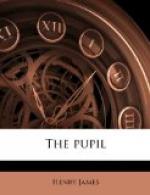of perceptions created another tie. Morgan had
never been so interesting as now that he himself was
made plainer by the sidelight of these confidences.
What came out in it most was the small fine passion
of his pride. He had plenty of that, Pemberton
felt—so much that one might perhaps wisely
wish for it some early bruises. He would have
liked his people to have a spirit and had waked up
to the sense of their perpetually eating humble-pie.
His mother would consume any amount, and his father
would consume even more than his mother. He
had a theory that Ulick had wriggled out of an “affair”
at Nice: there had once been a flurry at home,
a regular panic, after which they all went to bed
and took medicine, not to be accounted for on any
other supposition. Morgan had a romantic imagination,
led by poetry and history, and he would have liked
those who “bore his name”—as
he used to say to Pemberton with the humour that made
his queer delicacies manly—to carry themselves
with an air. But their one idea was to get in
with people who didn’t want them and to take
snubs as it they were honourable scars. Why
people didn’t want them more he didn’t
know—that was people’s own affair;
after all they weren’t superficially repulsive,
they were a hundred times cleverer than most of the
dreary grandees, the “poor swells” they
rushed about Europe to catch up with. “After
all they
are amusing—they are!”
he used to pronounce with the wisdom of the ages.
To which Pemberton always replied: “Amusing—the
great Moreen troupe? Why they’re altogether
delightful; and if it weren’t for the hitch
that you and I (feeble performers!) make in the ensemble
they’d carry everything before them.”
What the boy couldn’t get over was the fact
that this particular blight seemed, in a tradition
of self-respect, so undeserved and so arbitrary.
No doubt people had a right to take the line they liked;
but why should his people have liked the line of pushing
and toadying and lying and cheating? What had
their forefathers—all decent folk, so far
as he knew—done to them, or what had he
done to them? Who had poisoned their blood with
the fifth-rate social ideal, the fixed idea of making
smart acquaintances and getting into the monde chic,
especially when it was foredoomed to failure and exposure?
They showed so what they were after; that was what
made the people they wanted not want them.
And never a wince for dignity, never a throb of shame
at looking each other in the face, never any independence
or resentment or disgust. If his father or his
brother would only knock some one down once or twice
a year! Clever as they were they never guessed
the impression they made. They were good-natured,
yes—as good-natured as Jews at the doors
of clothing-shops! But was that the model one
wanted one’s family to follow? Morgan had
dim memories of an old grandfather, the maternal,
in New York, whom he had been taken across the ocean
at the age of five to see: a gentleman with a




